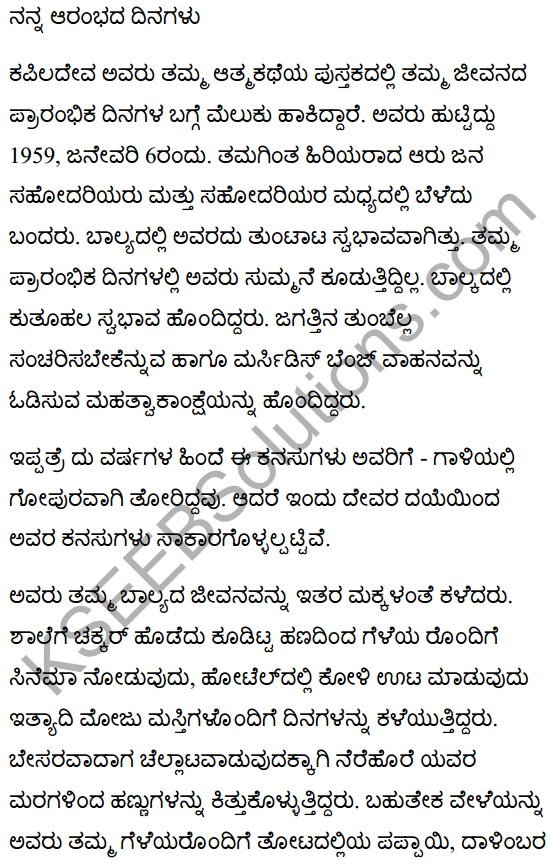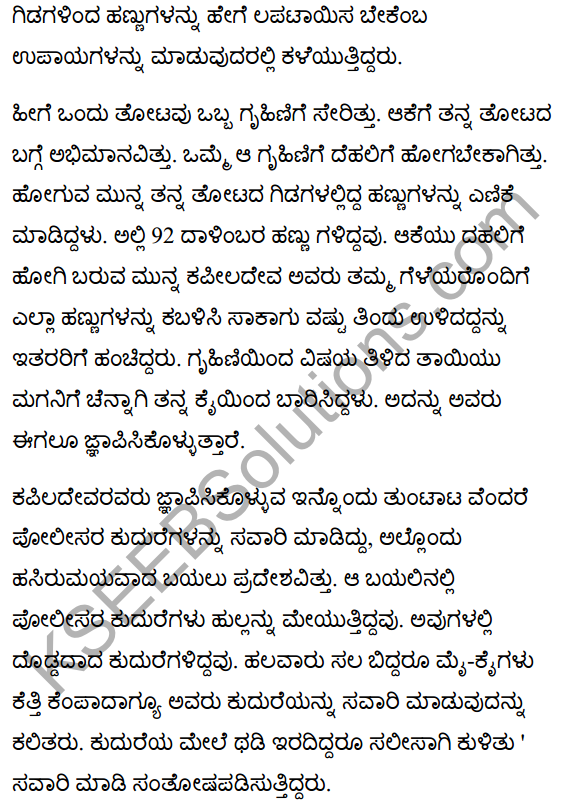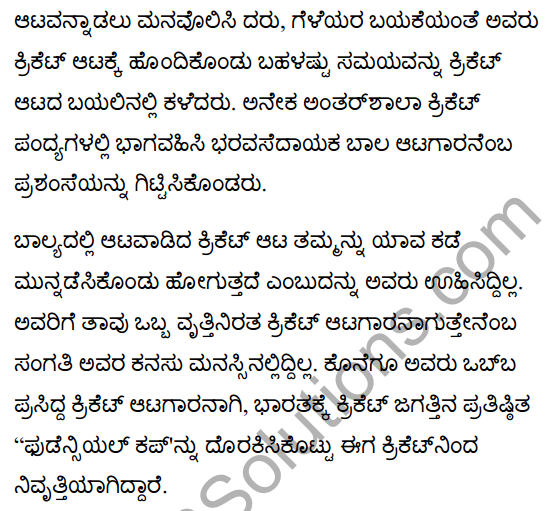You can Download My Beginnings Questions and Answers Pdf, Notes, Summary Class 9 English Karnataka State Board Solutions to help you to revise complete Syllabus and score more marks in your examinations.
My Beginnings Questions and Answers, Notes, Summary
Before You Read
Read the extract from Mahatma Gandhi’s autobiography.
……….. when I was in the seventh standard Dorabji Edulji Gimi was the headmaster. He was popular among the boys, as he was a disciplinarian, a man of method and a good teacher. He had made gymnastics and cricket compulsory for boys of the upper standards. I disliked both. I never took part in any exercise, cricket or football, before they, were made compulsory. My shyness was one of ,the reasons for this aloofness, which I now see was wrong. I then had the false notion that i gymnastics had nothing to do with education.
Today I know that physical training should have as much place in the curriculum as mental training.
Now sit with your partner. Ask your partner the following questions and discuss.
Question 1.
Was Gandhiji right in his opinion? If yes, why? If not, why?
Answer:
No. Gandhiji was not right in his opinion because physical training is very important. Only mental training makes man dull.
Question 2.
‘Should sports and games he made compulsory in schools and colleges’? Discuss.
Answer:
Sports and games should be made compulsory. Otherwise there would be no extra development. Man becomes dull and lethargic. If man plays sports and games, he would be always active and agile. Gymnastics has a lot to do with education physical training gives man activeness and joy. Otherwise there would be no overall development.
Check you Comprehension (Share your response)
Questions and Answers (Sub Unit 1, 2)
Question 1.
Kapil says, “The date, 6th January 1959, was thankfully recorded.” Why does he feel so?
Answer:
Kapil says, “The date 6th January 1959 Was thankfully recorded.” It is his birth date. As his mother was illiterate, she didn’t have the knowledge of recording the date. But his cousin was born on 6th January 1959, on the same date he too was born. The same birth date was recorded as his birthday. That’s why he says his date of birth 6th January 1959 was thankfully recorded.
Question 2.
Kapil says, “But at that time…. these dreams seemed like castles in the air, What were these dreams? Were these dreams realized?
Answer:
The dreams were-
1. ambition to travel around the world.
2. driving a Mercedes Benz.
At that time these dreams seemed like castles in the air.
But these dreams were realized. That means they came to him true.
Question 3.
What did Kapil’s mother always regale him with?
Answer:
Kapil’s mother always regaled him with his naughty behaviour.
Question 4.
Kapil uses an idiomatic expression ‘castles in the air’. What does this mean?
Answer:
The idiomatic expression “Castles in the air” means plans or hopes that one has are unlikely ever to become real. In the beginning, Kapil had dreams of travelling around the world and driving Mercedes Benz. They seemed impossible. That’s why Kapil uses the idiomatic expression “castles in the air.”
Check Your Comprehension
Share your responses (Subunit 3, 4)
Question 1.
In what way was Kapil ‘like all the other children’ around him?
Answer:
Most of the children during Kapils childhood instead of going to school wandered here and there spending a lot of money to see new movies or eat food in hotels. In the same way, Kapil was like other children trying to bunk school and save up money to go to a new movie or have a plate of chicken chowmein with his friends.
Question 2.
In the third paragraph, Kapil says his neighbour’s lady grew trees. What were the two trees grown there?
Answer:
The two trees grown there by neighbour’s lady were papaya and pomegranate trees.
Question 3.
How did Kapil and his friends spend most of their time in their childhood?
Answer:
Kapil and his friends spent most of their childhood breaking the fruit off their neighbour’s tree, trying to bunk school going to new movie or getting a plate of chicken chowmein.
Question 4.
What had Kapil done that he had to sit still for two hours?
Answer:
Kapil and his friend had climbed up the papaya tree to pick the fruit. This made him to sit still for two hours on the tree, because they were afraid of escaping from the tree, when the lady, the owner of the trees was entertaining some guests for tea right under the papaya tree for two hours.
Question 5.
What discovery did Kapil make by sitting on the papaya tree?
Answer:
The discovery that Kapil made by sitting on the papaya tree was the rash that papaya sap can cause.
Question 6.
“She counted them every day.” What did the lady count every day? Why? ‘I got even the next day.’ What does this mean? What does this tell us about Kapil?
Answer:
Every day the lady counted pomegranates on the tree in her garden because she knew Kapil and his friends were up to mischief.
Kapil, what he experienced on the top of the papaya tree belonged to the lady, did not tell his mother about it. He tells that he got the same situation the next day when his neighbour, the lady, who had pomegranate trees in her garden went Delhi. Before leaving for Delhi the lady had counted pomegranate fruit 92.
Check your Comprehension:
Share your responses (Subunits 5, 6, 7)
Question 1.
What naughty thing does Kapil narrate in the 7th paragraph?
Answer:
The naughty thing that Kapil narrated in the 7th paragraph is that slowly, almost imperceptibility he switched from one game to the other and bengan to spend a lot of his time on the cricket field. Always he did not sit still.
Question 2.
Nobody would have noticed except for the fact that I bit off more than I could chew. What is the incident described here?
Answer:
Kapil Dev and his friends had learned to master horses. They became more courageous and ventured out of the fenced area with the horses. Nobody would have noticed. But riding a horse created a lot of inconveniences but he ventured to repeat it again. Once he had taken the horse to his home, but he could not enter the house as the doorway was small He was caught by his father who discouraged him from repeating it.
Question 3.
Why does Kapil say he bit off more than he could chew?
Answer:
Once, Kapil Dev decided to take the horse home and tether him in his back garden. But he could not anticipate that it would be very difficult to take the horse through the small doorway. He and his friends were caught by his father and discouraged from riding a horse again. So Kapil says that “He bit off more than he could chew”.
Question 4.
How did Kapil’s father react to his escape?
Answer:
His father caught him and discouraged him not to ride again. Later his father discouraged his venturing into the grazing fields.
Question 5.
What were the games offered in a local school where Kapil was studying?
Answer:
The games offered in a local school where Kapil was studying were basketball, football, table tennis and hockey near the grazing field.
Question 6.
In which game was Kapil fairly good at in his school days?
Answer:
He was fairly good at all games, exceptionally good at athletics, and dreaming of becoming a footballer.
Question 7.
‘That is a decision I will always be grateful to them for, as they unconsciously introduced me to the game for which I was made.’ What was the ‘decision’?
Answer:
Kapil Dev had taken the decision to change his game from football to cricket. He dreamed of becoming a footballer. He worked hard at that game and was selected to play for his school. But his friends were interested in playing cricket. They convinced him to change his game. He took the decision and changed his game. That was a turning point in his life as he excelled in cricket at the International level.
Question 8.
‘But it was all merely fun to start with.’ What is Kapil talking about? Do you think cricket remained merely fun for him forever?
Answer:
Kapil is talking about the game of cricket. On his friend’s advice, he began to play cricket. He played in a number of inter-school tournaments. He appeared as a “promising lead” in the local press (newspaper). But it was all merely fun for him to start with. We think cricket did not remain merely fun for him forever, because he became a professional cricketer then.
C1. Kapil narrates an incident from his childhood. Related to his childhood life. Some sentences are given below. Working in pairs/groups, arrange them in the right order.
a) A lady lived down the road and she had a beautiful garden.
b) She entertained the guest for tea right under the papaya tree.
c) Two others were on the road on the other side of the wall.
d) One day Kapil and his friends climbed over the wall and perched on the tree.
e) That was the day Kapil discovered the rash that papaya sap can cause.
f) She took great pride in papaya and pomegranate which she had grown in her garden.
g) Two friends, who had been outside, ran away.
h) But Kapil and his friend had to sit for nearly two hours till the tea party ended.
Rearranged the sentences in the right forms:
a) A lady lived down the road and she had a beautiful garden.
b) She took great pride in papaya and pomegranate which she had grown in her garden.
d) One day Kapil and his friends climbed over the wall and perched on it.
e) She entertained the guests for tea right under the papaya tree.
f) Two others were on the roadside on the other side of the wall.
g) Two friends, who had been outside, ran away.
h) But Kapil and his friend had to sit for nearly two hours till the tea party ended.
i) That was the day Kapil discovered the rash that papaya sap can cause.
C2. Say whether the following statements are true or false. Write ‘T’ or ‘F’ in the box accordingly.
a) Kapil was born into a large family. (T)
b) Kapil came to know about the date of his birth from his mother. (T)
c) The lady who was a neighbour to Kapil counted ninety-two pomegranates on the tree in her garden because she was good at mathematics. (F)
d) The police horses became Kapil’s pet. (T)
e) Kapil was good at athletics and dreamed of becoming a footballer. (F)
C3. Imagine you are narrating Kapil’s childhood experiences to your friend.
How can you narrate this? You can begin…
Kapil shares two very interesting incidents with the reader. Kapil was good at athletics and dreamed of becoming a footballer. Another was that his neighbour counted Ninety Two pomegranates on the tree in her garden because she was good at mathematics.
Vocabulary
V1. Study the following sets of words. Pick out the one that does not belong. (Say why it doesn’t belong.)
Question 1.
football, athletics, basketball, volleyball.
Answer:
Athletics (because the other three are all ‘ball games’).
Question 2.
coach, learner, teacher, trainer.
Answer:
learner (because other three do the work of guidance).
Question 3.
boxing, running, jumping, throwing.
Answer:
boxing (because other three belong to physical exercises).
Question 4.
stamina, speed, skill, sports.
Answer:
sports (because the other three belong to one category).
Question 5.
victory, success, defeat, win.
Answer:
defeat (because the other three give the same meaning).
Question 6.
medal, shield, cup, competition.
Answer:
competition (because the other three are prizes).
V2. Notice the words given in brackets. Do you find anything special about these words? If you find, what is it?
(lick, munch, sip, drink, chew, swallow, cat, lap, dine, suck, gulp)
Fill in the blanks using the appropriate words given in brackets. You can change the form of the word.
Question 1.
They’d ……………. their way through three packets of biscuits, (to eat something noisily)
Answer:
munched.
Question 2.
A dog ………….. up the drops spilt on the floor, (to move your tongue across the surface of something in order to eat it)
Answer:
licks.
Question 3.
Ranjitha was sitting at the table ……………. her coffee, (to drink something slowly)
Answer:
sipping.
Question 4.
You should ……………… plenty or water, (to take liquid into your mouth)
Answer:
drink.
Question 5.
This nut is so tough 1 can hardly ……………. it! (to bite food several times before swallowing it)
Answer:
chew.
Question 6.
Sathvik ………………… the last drop of his coffee and asked for the bill, (to make food or drink go down your throat and into your stomach)
Answer:
swallow.
Question 7.
Hemanthini …………………. up the last bit or milkshake with her straw, (to take liquid into her mouth by making her lips form a small hole)
Answer:
Sucked.
Question 8.
A small girl was ………………. ice cream, (to put food in her mouth and chew and swallow it).
Answer:
eating.
Question 9.
The cat began ………………. to up the milk, (it drinks it by putting its tongue into it)
Answer:
lap.
Question 10.
Umesh was …………………. with friends at the Taj Hotel, (to eat dinner)
Answer:
dining.
V3. You are observing the cricket playground. Work in pairs or groups. Pick up the words from the brackets and fill the worlds in the appropriate boxes.
(long off, point, cover, extra cover, mid-off, bowler, sightscreen, long on, mid-on, batsman, mid-wicket, silly mid-on, squire leg, deep squure leg, leg slip or short fine leg, long leg, deep fine leg, wicket keeper, sightscreen, slips gully, silly mid-off, third man)
Answer:

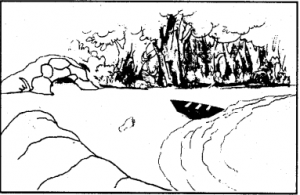
Now sit in pairs/groups and discuss the questions/issues given below.
Question 1.
Bobby Pearce was ready to lose the race to save the ducks. How did this incident impress everybody.
Answer:
When Bobby Pearce saw a duck and her brood of ducklings swimming across the canal, he thought his boat was going to run into them. So he slowed his boat down. His action won everybody’s heart and he won the goodwill of the children of Amsterdam. His Australian friends called him ‘Bobby is that kind of bloke’.
Question 2.
Should sports persons try to win at all costs? Or should they be thoughtful and kind even at the risk of losing?Answer:
Sports person should not try to win at. all costs. They need to be thoughtful like Bobby Pearce became winning alone does not matter.
Question 3.
“Sentiment, or killing spirit” what do you feel is more important in a game?
Answer:
I always feel that sentiment is more important is a game.
Listen and comprehend:
Your teacher will read out the text. Listen carefully. While Listening, draw the route map.
One day I came out of home. It was a fine morning. As I was going towards my boat, I was surprised to see a footprint of a man on the sand. I stood amazed! I listened; 1 looked around me. I could neither here nor see anything. 1 went up the hill to look down, but 1 could see nothing. I came down the hill back to my boat. I went up the shore and down again to my boat, but it was no good. I went into the woods from the West. I once again went up the hill and down again but I could find no other footprint but that one. I went to have a look at the footprint again to tell if it had been my imagination.
But I was not mistaken – for there was exactly the print of a foot – toes, heel and every part of the foot.
I stood a long time thinking, but became more confused. At last 1 returned home very frightened looking behind me every few steps.
Choose the right word given in brackets:
Question 1.
The use of credit cards ………… (has/have)” increased hundred fold in the last decade.
Answer:
has
Question 2.
Half the students in the class …………….. (was/were) absent yesterday.
Answer:
was
Question 3.
The number of poisonous snakes ………… (is/are) not known accurately.
Answer:
is
Question 4.
I…………. (am/is/was) not hungry now.
Answer:
am
Question 5.
We …………. hadn’t/hasn’t/haven’t) seen him of late.
Answer:
haven’t
Question 6.
Salim …………. (do not/does not) know now to cook.
Answer:
does not.
Now fill in the blanks in the following sentences with the appropriate form of ‘sport’ from the extract above:
1. “Why do you take it seriously? Lokesh has said it as a boy.
2. In olden days hunting was a passion.
3. I hope, being a helpful person, you would lend me your book.
4. Why don’t you watch TV? There is too much Fun on TV today.
5. Cricket is the most popular game in India.
6. Street dogs, I agree, are a menace. But killing them is a bad sport.
7. Rajesh plays state level Kabaddi. He always remembers his school which encouraged team spirit.
My Beginnings Additional Questions and Answers
Choose the correct answer:
Question 1.
The lesson “My beginnings” is taken from the autobiography of:
(a) Sunil Gavaskar.
(b) Sachin Tendulkar.
(c) Rahul Dravid.
(d) Kapil Dev.
Answer:
(d) KapilDev
Question 2.
Kapil Dev grew up among :
(a) Six brothers and sisters.
(b) Six brothers and six sisters.
(c) Six brothers and one young sister.
(d) Six elder brothers and sisters.
Answer:
(a) Six brothers and sisters.
Question 3.
Once Kapil dev had to sit still for nearly two hours on :
(a) Mango tree
(b) Papaya tree
(c) Appletree
(d) Jack fruit tree.
Answer:
(b) Papaya tree.
Question 4.
Kapil dev and his friends were riding:
(a) Neighbour’s horses
(b) Racehorses
(c) Police horses
(d) Army horses.
Answer:
(c) Police horses
Question 5.
Kapil Dev was dreaming of becoming a:
(a) Cricketer
(b) Foot bailer
(c) Basket ball player
(d) Tennis player.
Answer:
(b) Footballer.
Question 6.
I spent my childhood like all the other children _________ me. The correct preposition to be filled in the blank is.
(a) on
(b) to
(c) with
(d) around.
Answer:
(d) around.
Question 7.
Pick out the one that does not belong to the group :
(a) Football
(b) Athletics
(c) Basketball
(d) Volleyball.
Answer:
(b) Athletics.
Question 8.
Salim ________ know how to cook. Choose the right word to fill the blank :
(a) do not
(b) doesn’t
(c) has not
(d) have not.
Answer:
(b) doesn’t
Answer the following questions.
Question 1.
When and where was Kapil born?
Answer:
Kapil Dev was born on 6th January 1959, in Chandigarh.
Question 2.
What is the name of his autobiography?
Answer:
Straight from the Heart’ is the name of his autobiography.
Question 3.
Why did Kapil Dev climb the Papaya tree?
Answer:
He climbed the papaya tree to pluck papayas.
Question 4.
Who convinced Kapil Dev to play cricket and why?
Answer:
His friends convinced him to play cricket. Because they were interested in cricket and they were playing cricket.
Question 5.
What is a biography?
Answer:
Story or life history of a person written by another person.
My Beginnings Summary in English
Kapil dev says in his autobiography that looking back at his life, he has come to the conclusion that their beginnings never know their ends. According to him, his beginning started in Chandigarh, a small town surrounded by the hills of Himalayas. He was born on 6th January 1959. He had six brothers and sisters. They were older than him.
He was very curious and he had the ambition to travel around the world and drive a Mercedes Benz. According to him his both wishes were fulfilled. But these two dreams, twenty-five years ago seemed to him like casjtles in the air.
In his childhood, Kapildev spent the days like other children. Sometimes he used to leave school without telling anyone. As he had enough money, he would go to new movie and sometimes had a food of chicken chowmein with his friends. If he and his friends bored, they would amuse by, breaking fruit off their neighbours tree. Kapildev narrates an incident of picking fruit off the trees in a garden belonged to a lady.
Once they entered the garden. They climbed over the wall and came on the top of the papaya tree. Meanwhile the lady came out of the house with some guests. She entertained them for tea right under the papaya tree, on which Kapildev and his friend had taken position. The were afraid of the situation. They had to sit still there until the tea party was over. The tea party lasted for two hours. That was the day he experienced red spot on his skin.
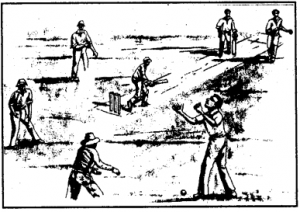
The next day the lady, the owner of the garden had to leave for Delhi. Before she went to Delhi, she had ninety two pomegranates on the tree in her garden, counted many times, because she kneyr their mischief. Before she turned back from Delhi; Kapildev and his friends had taken down ninety two pomegranates and had eaten whatever they could and had distributed the rest. The lady told his mother. what happened in garden. The mother got angry and she gave her son such blow that he could never forget in his life.
The another naughty thing that Kapildev did was that there was the huge open green area where the police horses used to graze, Kapildev and his friends tried to ride them. Despite innurable falls and fright, he learnt to ride a horse and control him once he and his friends had learnt to master the horse. They became more courageous and ventured out of fenced area with the horses. Nobody would have noticed except for the fact that he bit off more than could chew. He decided to take the horse home and house him in their back garden.
He struggled to get the horse through the tiny five and a half foot by two foot door way. He and his friends were caught within minutes of their arrival. The horse, of course was duly returned and the hiding he received from his father discouraged his venturing near the grazing fields again.
Kapildev was not studious. He spent much of his time playing games. He was fairly good at all games. He dreamed of becoming a foot bailer. But his friends were interested in cricket. They persuaded him to change his game. He would always be grateful to them, because they introduced him to the game of cricket. Hence then he spent a lot of time on the cricketer field and played a number of inter-school tournaments. He came to be noticed a promising lad in the game of cricket. At last cricket led him to become a professional player.
My Beginnings Summary in Kannada
